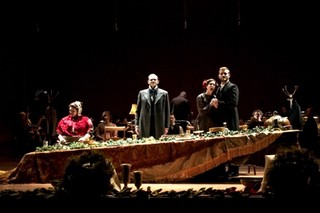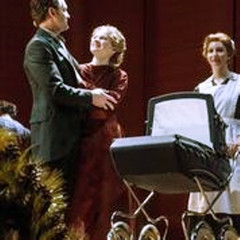|
Back
Time’s Passing in Words and Music New York
Alice Tully Hall, Lincoln Center
12/19/2014 -
Thornton Wilder: The Long Christmas Dinner
Paul Hindemith: The Long Christmas Dinner
CAST OF THE PLAY: Hannah Mitchell(Lucia, Lucia 2), Lars Berge (Roderick, Samuel), Claire Moodey (Mother Bayard, Cousin Ermengarde, Nurse), Ryan-James Hatanaka (Cousin Brandon, Roderick 2), Michael E. Salinas (Charles), Arielle Goldman (Genevieve), Libby Matthews (Leonora Banning)
CAST OF THE OPERA: Camille Zamora (Lucia, Lucia II), Sara Murphy (Mother Bayard, Ermengarde), Jarrett Ott (Roderick, Sam), Josh Quinn (Brandon), Glenn Seven Allen (Charles), Catherine Martin (Genevieve), Kathryn Guthrie (Leonora), Scott Murphree (Roderick II), Kathryn Moody (Nurse)
American Symphony Orchestra, Leon Botstein (Conductor)
Jonathan Rosenberg (Director), Zane Pihlstrom (Scenic Designer), Olivera Gajic (Costume Designer), Peter West (Lighting Designer), Thurmond Smithgall (Producer)

S. Murphy, J. Quinn, C. Zamora J. Ott (© Jito Lee)
”Only the passing of time...”, Thornton Wilder, The Long Christmas Dinner
Like the other deceivingly prosaic phrases about time in The Long Christmas Dinner, Thornton Wilder’s meanings are far deeper than mere words. Wilder was described (equally prosaically) as “sophisticated”, but in reality, he was perhaps America’s only philosophical dramatist., More specifically, his imagery, his explorations of duration, his profound humanism, would place him amongst the 17th Century Metaphysical poets.
In fact, The Long Christmas Dinner, with its wonderment at relationships, its creation of a human evolution, everything within the most mundane setting, would go to prove Donne’s maxim that we are not solitary islands. Wilder was the opposite of the Existentialists. He was saying here that every event, every person, is related to every other event, every other person.
Whether we like it or not.
Wilder never approved any opera or musical based on is plays, understanding that his meanings were not exoteric. But Paul Hindemith had an intellect and understanding appealing to Wilder personally and professionally. So after much communication, Wilder rewrote the script of the play (the characters were the same, but lines were given poetic meter, even rhymed), and Hindemith, who was fascinated by stories that had more meaning that realism, wrote this, his last opera, two years before he died.
Watching both the play and the opera last night was a revelation as to how wonderful Wilder could be. Like Our Town, it takes place in an everyday setting. In this case, a long Christmas table, set with ivy leaves, wine-glasses, a carafe, and a carving plate for the Christmas turkey.
Into this dinner, relatives–grandmother, husband wife–and from which different characters go off to the side, take a deep breath (in the play) or simply walk over to a red stool to die. In their place come other children, cousins, sons and daughters. At the start, the house is one year old, as the dinner continues, the years go by with inconspicuous directions…five years, a quarter century...the actors grow old and die, others give some indication of their times.
The grandmother tells about how there were Indians still on the land when she came, a grandson (or great-grandson) has been in the Great War and sacrificed his life.
So we know that the 90 year setting has started before the Civil War, ending around the 1920’s. Though nothing in the setting, the costumes or the language specifies this.
I am not a drama critic, but the drama before the opera was stunning. Inevitably, we see the actors quite consciously aging, but nothing can prevent that. Hearing the drama for the first time, I was utterly involved in the idea, moods, changes, and those oh so sad breaths before demise.
For the Hindemith opera, director Jonathan Rosenberg of course used the same setting, with very little changed in the acting. Words were changed for their musicality (“I remember” is changed to “I can remember”), other scenes are enlarged (the Soldier, giving a touchingly short scene in the drama is given a long aria with musical comments here), but we now know all the movements, we already understand how some of the characters have traveled, returned, and are given their–our!–fates.
Like a rondo, the play brings back the themes of cutting the turkey, passing the wine for each new character. Like a play by Ionesco, each character remarks on the weather, never the same, although the opera continues without a break.

G. S. Allen, K. Guthrie, C. Moodey (© Jito Lee)
And while most singers and actors have two roles to play (ah, Darwinian evolution), one doesn’t think about the illusion. Wilder was too smooth a dramatist, Hindemith too telling a composer.
We had here an ensemble of excellent singers for their voices alone. The acting, and again the self-conscious aging are part of the illusion. So one heard the voices for themselves. Sarah Murphy, who had shattered Carnegie Hall in the Ligeti Requiem last week, was the old lady from the beginning–and in the last moments, reads the letter about another home and another “first Christmas dinner.” The others in the cast, all of them experienced opera stars, with voices to match, were each effective in their own ways.
Leon Botstein wisely put his abbreviated orchestra far in the back of the stage, so the balance of words and music were never in doubt. And with most of the music taken with solo instruments, his virtuoso players had were as evocative as the singers.
But what about Paul Hindemith? One critic last night bemoaned the fact that the music didn’t change with the times. Yet that would have contradicted the philosophy of the drama, that “it will be all the same in a hundred years,” or that “time passes in the twinkle of an eye”, or that “time passes so slowly here...”
Wilder’s knowledge of everything (sic!) meant he certainly knew of our quantum-time illusions, so there was no need to emphasize this.
Hindemith does begin with a chorale (“God rest ye merry, Gentlemen”), ending with a variation of the same, reflecting the toasts said during the dinner. Other than this, the harmonies were purely Hindemithian, and the musical forms were those of early opera. We had jaunty themes for the young characters, even a tarantella, we had many quartets and trios, some beautiful duets. The recitatives were of course musically accompanied. But the genius lay in the Wilder-Hindemith coupling in allowing these ensemble works to blend in so naturally with the speaking roles.
Hearing this production–sorry, thesre productions for the first time, I was aware of Wilder’s ineffable genius for turning each microscopic moment into a macroscopic link to something else. (Remember Emily’s envelope in Our Town, addressed to number, street, town...all the way to “the Eye of God”?)
Whether Paul Hindemith could expand these ideas, this drama into great opera is questionable. Yet Wilder trusted him. And in these productions, we learned that, no matter what the music, we experienced (as characters of several generations spoke here), far more than “Only time, only the passing of time...”
Harry Rolnick
|